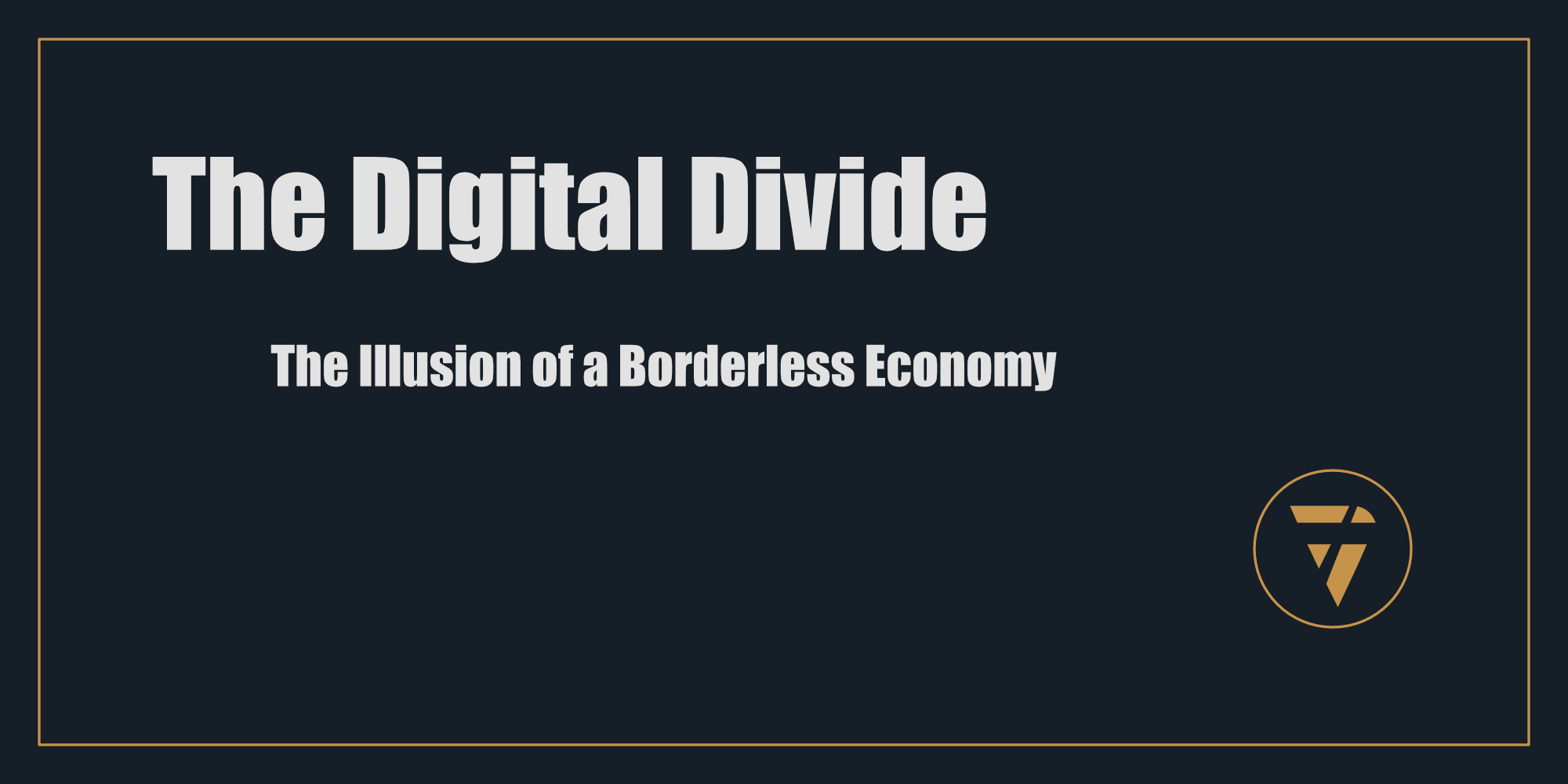The Digital Divide

The Illusion of a Borderless Economy
The internet was supposed to democratize opportunity. The digital economy, built on open access to information and global connectivity, promised to level the playing field, allowing anyone with a good idea and an internet connection to compete on equal footing.
That was the theory.
The reality is far different. Instead of a decentralized, accessible economy, the digital world has become a new frontier for consolidation, inequality, and systemic exclusion.
A handful of tech giants control digital infrastructure, data, and platforms.
Wealth and market power concentrate in a few global hubs, leaving entire regions behind.
Automation and AI displace jobs faster than new opportunities are created.
Access to capital and digital literacy determine who thrives and who is left behind.
The result is a deepening divide between those who benefit from the digital economy and those who are being systematically shut out.
This is not a technological inevitability—it is a choice, shaped by policy, investment, and the priorities of the companies that dominate the internet.
Understanding this divide is the first step toward reshaping it.
The Two Sides of the Digital Economy
Who Wins?
The winners of the digital economy are those who control the platforms, data, and financial infrastructure that power online commerce, automation, and AI.
Tech monopolies dominate the landscape. Google, Amazon, Meta, Apple, and Microsoft have become the gatekeepers of the internet, extracting value from nearly every digital transaction.
Financial institutions and speculators control much of the digital economy’s underlying wealth. Venture capitalists, hedge funds, and private equity firms profit from IPOs, mergers, and market consolidation.
High-skilled knowledge workers benefit from demand for specialized skills. Those in AI, cybersecurity, blockchain, and cloud computing secure lucrative opportunities in an otherwise volatile job market.
Companies that automate increase their profit margins by replacing human labour with AI and robotics, cutting costs while scaling their operations.
The digital economy isn’t lifting everyone—it is concentrating power in fewer hands.
Who Loses?
Traditional workers face job displacement as automation and AI replace positions in retail, customer service, transportation, and manufacturing.
Small businesses without digital infrastructure struggle to compete with massive e-commerce platforms that offer lower prices, faster shipping, and AI-driven customer acquisition.
Emerging markets without access to capital remain excluded from the financial and technological infrastructure needed to participate in the digital economy.
Users who generate value for platforms they don’t control—social media users, gig workers, and digital creators—contribute billions in unpaid labour, while earning a fraction of the profits.
The Mechanisms of Digital Inequality
The divide isn’t random—it is driven by structural barriers that favour the already powerful.
Digital Monopolies and the Death of Competition
The early internet was a decentralized space, where independent websites, businesses, and creators could grow. Today, most of the internet is controlled by a few tech giants that act as gatekeepers.
Google controls search and online advertising, determining which businesses and voices are visible.
Amazon dominates e-commerce, using data from third-party sellers to strengthen its own competitive advantage.
Facebook and Instagram dictate the reach of digital content, forcing businesses to pay for visibility.
These platforms don’t just host the digital economy—they own it. Instead of free and open competition, smaller businesses must operate within the rules set by monopolies that extract profit from every transaction.
Automation and the Erosion of Labour Power
The rise of automation and AI is creating efficiencies for businesses while eliminating stable employment. AI-driven software is replacing white-collar jobs in finance, law, and customer service. Robotics and machine learning are reducing the need for human workers in logistics and manufacturing.
The gig economy was initially seen as a way for workers to gain independence, but it has instead created a system where companies offload costs, reduce job security, and minimize wages. Gig workers and freelancers are highly replaceable, with little power to negotiate better terms.
Digital Wealth Concentration and Capital Barriers
Wealth in the digital economy is not generated evenly. The businesses that thrive are those with access to capital, and investment is overwhelmingly concentrated in a few regions. Silicon Valley, London, and a handful of financial centres capture most venture capital funding, while entrepreneurs in other parts of the world struggle to secure even modest backing.
The result is an economic model where financial resources flow toward companies that already have an advantage, reinforcing the gap between digital winners and everyone else.
Rebalancing the Digital Economy
The current trajectory of the digital economy is not sustainable. A system that concentrates power, excludes large segments of the population, and extracts value without reinvesting in workers and local economies will eventually collapse under its own weight.
The digital economy can be redesigned to create broader prosperity.
Decentralized platforms that distribute ownership and governance could provide alternatives to monopolized services.
Worker co-operatives in digital industries could allow creators, developers, and service providers to retain a greater share of the wealth they generate.
Public investment in digital infrastructure and access to funding for small businesses could reduce dependence on tech monopolies.
Regulatory frameworks that prevent platform dominance and ensure fair competition could restore balance to online markets.
These changes won’t happen on their own. The current power structures of the digital economy are deeply entrenched, and those who benefit from them will resist reform. But economic history is full of shifts that once seemed impossible.
The digital economy is still evolving. The question is whether it will continue consolidating wealth and opportunity in fewer hands, or whether it will be reshaped to serve a broader, more equitable vision of prosperity.
The divide is growing. The outcome is not yet determined.
This is what I’m working on. Tell me what you think, I enjoy the conversation! Subscribe and follow the work in real time.
Thanks!
B

The digital economy promised opportunity. Instead, it concentrates power. Tech monopolies extract value, automation erodes jobs, and access to capital determines who wins. The game is rigged, but it doesn’t have to be. The future is ours to build.
PS -

Want to learn the new rules?






